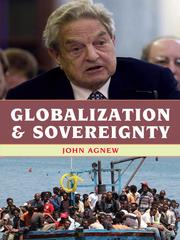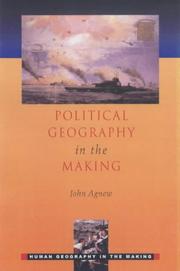| Listing 1 - 10 of 32 | << page >> |
Sort by
|

ISBN: 0471948861 Year: 1995 Publisher: Chichester : John Wiley & Sons,
Abstract | Keywords | Export | Availability | Bookmark
 Loading...
Loading...Choose an application
- Reference Manager
- EndNote
- RefWorks (Direct export to RefWorks)
Rome (Italy) --- Rome (Italie) --- History --- Histoire --- Geografie --- Sociale geografie --- Bewoning en leefgemeenschap.

ISBN: 9780742556782 9780742556775 9780742566750 0742566757 0742556786 Year: 2009 Publisher: Lanham : Rowman & Littlefield Publishers,
Abstract | Keywords | Export | Availability | Bookmark
 Loading...
Loading...Choose an application
- Reference Manager
- EndNote
- RefWorks (Direct export to RefWorks)
Sovereignty. --- Globalization --- Souveraineté --- Mondialisation --- Political aspects. --- Aspect politique --- Sovereignty --- Political aspects --- Souveraineté --- Globalization - Political aspects

ISBN: 0043201776 Year: 1987 Publisher: Boston (Mass.) : Allen and Unwin,
Abstract | Keywords | Export | Availability | Bookmark
 Loading...
Loading...Choose an application
- Reference Manager
- EndNote
- RefWorks (Direct export to RefWorks)
Political sociology. --- Political geography. --- Sociologie politique --- Géographie politique --- Scotland --- United States --- Ecosse --- Etats-Unis --- Politics and government. --- Politique et gouvernement --- Political geography --- Political sociology --- Mass political behavior --- Political behavior --- Political science --- Sociology --- Geography, Political --- Human geography --- Sociological aspects --- Government --- History, Political --- Géographie politique

ISBN: 0340759550 0340759542 Year: 2002 Publisher: New York : Distributed in the United States of America by Oxford University Press,
Abstract | Keywords | Export | Availability | Bookmark
 Loading...
Loading...Choose an application
- Reference Manager
- EndNote
- RefWorks (Direct export to RefWorks)
Political geography. --- Geopolitics. --- Géographie politique --- Géopolitique --- Geografie --- Sociale geografie --- Politieke Geografie. --- Géographie politique --- Géopolitique
Book
ISBN: 3885705044 Year: 2001 Publisher: Heidelberg University of Heidelberg. Department of geography
Abstract | Keywords | Export | Availability | Bookmark
 Loading...
Loading...Choose an application
- Reference Manager
- EndNote
- RefWorks (Direct export to RefWorks)
Book
ISBN: 1281093610 9786611093617 1592137679 Year: 2005 Publisher: Philadelphia : Temple University Press,
Abstract | Keywords | Export | Availability | Bookmark
 Loading...
Loading...Choose an application
- Reference Manager
- EndNote
- RefWorks (Direct export to RefWorks)
Hegemony tells the story of the drive to create consumer capitalism abroad through political pressure and the promise of goods for mass consumption. In contrast to the recent literature on America as empire, it explains that the primary goal of the foreign and economic policies of the United States is a world which increasingly reflects the American way of doing business, not the formation or management of an empire. Contextualizing both the Iraq war and recent plant closings in the U.S., noted author John Agnew shows how American hegemony has created a world in which power is no
Consumption (Economics) --- Globalization. --- Civilization, Modern --- World politics --- Geopolitics. --- American influences. --- United States --- Foreign economic relations. --- Economic policy. --- Foreign relations.
Book
ISBN: 9781538158630 9781538158623 Year: 2023 Publisher: Lanham, Maryland Rowman & Littlefield
Abstract | Keywords | Export | Availability | Bookmark
 Loading...
Loading...Choose an application
- Reference Manager
- EndNote
- RefWorks (Direct export to RefWorks)
"Hidden Geopolitics recaptures the term to explore how the geography of power works both globally and nationally to structure and govern the workings of the global political economy"--
Geopolitics --- Globalization --- World politics --- Economic aspects
Book
ISBN: 1538105195 9781538105191 1538105187 9781538105184 Year: 2018 Publisher: Lanham: Boulder: New York: London: Rowman & Littlefield,
Abstract | Keywords | Export | Availability | Bookmark
 Loading...
Loading...Choose an application
- Reference Manager
- EndNote
- RefWorks (Direct export to RefWorks)
This provocative and important text offers a new way of thinking about sovereignty, both past and present. Distinguished geographer John Agnew boldly challenges the widely popular story that state sovereignty is in worldwide eclipse in the face of the overwhelming processes of globalization. He argues that this perception relies on ideas about sovereignty and globalization that are both overstated and misleading. Agnew contends that sovereignty-state control and authority over space is not necessarily neatly contained in state-by-state territories, nor has it ever been so. Yet the dominant image of globalization is the replacement of a territorialized world by one of networks and flows that know no borders other than those that define the Earth itself. In challenging this image, Agnew first traces the ways in which it has become commonplace. He then develops a new way of thinking about the geography of effective sovereignty and the various geographical forms in which sovereignty actually operates in the world, offering an exciting intellectual framework that breaks with the either/or thinking of state sovereignty versus globalization.
Book
ISBN: 9781442212299 9781442212305 9781442212312 1442212314 1442212292 1442212306 9786613635006 128065807X Year: 2012 Publisher: Lanham, Md. Rowman & Littlefield
Abstract | Keywords | Export | Availability | Bookmark
 Loading...
Loading...Choose an application
- Reference Manager
- EndNote
- RefWorks (Direct export to RefWorks)
Dating from its inception in the late nineteenth century, political geography as a field has been heavily influenced by global events of the time. Thus, rather than trying to impose a single "fashionable" theory, leading geographers John Agnew and Luca Muscara consider the underlying role of changing geopolitical context as their framework for understanding the evolution of the discipline. The authors trace the development of key thinkers and theories during three distinct periods-1875-1945, the Cold War, and the post-Cold War-emphasizing the ongoing struggle between theoretical "monism" and "pluralism," or one path to knowledge versus many. The world has undergone dramatic shifts since the book's first publication in 2002, and this thoroughly revised and updated second edition focuses especially on reinterpretations of the post-Cold War period. Agnew and Muscara explore the renewed questioning of international borders, the emergence of the Middle East and displacement of Europe as the center of global geopolitics, the rise of China and other new powers, the reappearance of environmental issues, and the development of critical geopolitics. With its deeply knowledgeable and balanced history and overview of the field, this concise work will be a valuable and flexible text for all courses in political geography.
Political geography. --- Geopolitics. --- World politics --- Geography, Political --- Human geography
Book
ISBN: 9780754626909 0754626903 Year: 2008 Publisher: Aldershot : Ashgate,
Abstract | Keywords | Export | Availability | Bookmark
 Loading...
Loading...Choose an application
- Reference Manager
- EndNote
- RefWorks (Direct export to RefWorks)
Political geography. --- Geopolitics. --- Geographical perception. --- Géographie politique --- Géopolitique --- Perception géographique
| Listing 1 - 10 of 32 | << page >> |
Sort by
|

 Search
Search Feedback
Feedback About UniCat
About UniCat  Help
Help News
News